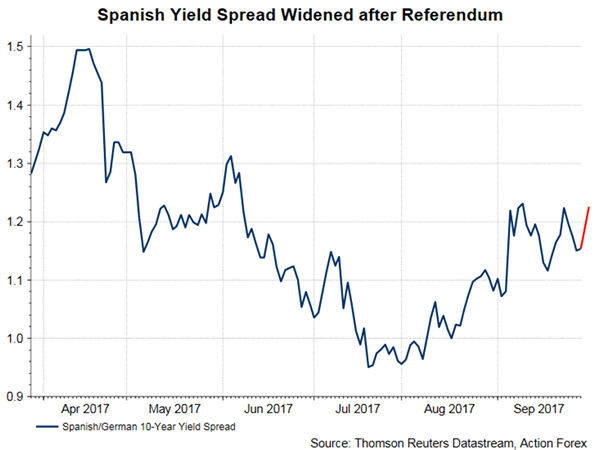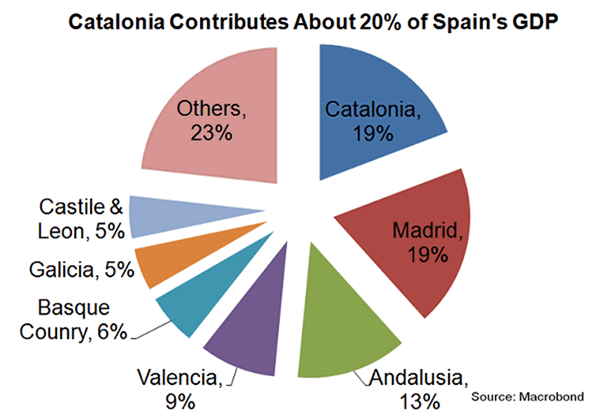Despite government’s violent intervention, Catalonia’s referendum took place and resulted in an overwhelmingly "yes" to seceding the region from the rest of Spain. European financial markets’ reactions are rather negative to the outcome. Euro’s selloff accelerated in the European morning with EURUSD falling -0.7% at the time of writing this report. Spanish equities fell with the benchmark IBEX index losing over -1% in the morning session. Treasuries fell, sending yields higher. The 10-year Spanish government bond yields soared to a 2.5-month high of 1.68%. Spread between Spanish-German 10 yields rose to the highest in 3 weeks. Last Friday, S&P affirmed Spain’s sovereign credit rating at BBB+/A-2 with a positive outlook. Despite optimism over the economic outlook, the rating agency warned of the current tensions between the central government and the regional government of Catalonia. It suggested that rating outlook would be revised to "stable from "positive" if the tensions "escalated and started weighing on business confidence and investment, leading to less predictable future policy responses".

Referendum Result
90% of voters said "yes" to Catalonia independence but the turnout rate, at 42.3% (2.3M votes), was similar to the one held in 2014. Back then, the Catalan government estimated a turnout rate of 41.6%, of which 80.8% voted yes to the questions "Do you want Catalonia to become a State?" and "Do you want this State to be independent?". The turnout for this year might be higher if the central government had not implemented such a "crackdown" on the campaign.
The referendum result – low turnout with a high level of affirmative votes-has been anticipated. Such outcome is common for non-binding referendums as "yes" voters turn out while others cold-shoulder. Indeed, anti-independence parties, such as PM Rajoy’s Partido Popular party, Ciudadanos and the PSOE, have discouraged their supporters to participate in this "illegal" referendum.
Catalan President Carles Puigdemont declared that "the citizens of Catalonia have won the right to have an independent state". He pledged to send the result to the Catalan parliament in the next few days "so that it can act in accordance with the law of the referendum". This could eventually lead to a unilateral declaration of independence within 48 hours after notifying the regional parliament of the voting result. By contrast, the Spanish prime minister, Mariano Rajoy continued to vowed the referendum illegal, condemning that the vote "only served to cause serious harm to coexistence" among Spaniards.
Aftermath
We expect the referendum outcome alone has limited impact on the solid economic fundamentals. The referendum has been declared unlawful by the court and the central government would by no means approve the result. However, depending how the conflicts evolve and how the government proceeds, the economic costs can be huge. Catalonia represents about 20% Spain’s GDP, prolonged strike and demonstrations would affect GDP.
Indeed, the actions adopted by the central government so far have escalated tensions between the Spanish government and the Catalan regional authorities, and accelerated political instability.
The minority government led by PM Rajoy has adopted various means, such as asking the Constitutional Course to invalidate the referendum bill passed by the Catalan government, removing voting materials and arresting regional officials involved in the referendum, in order to stop the referendum from taking place. The world has even witnessed the national police firing rubber bullets and hitting voters. It is estimated about 900 people were injured. A huge strike has been called across Catalonia on October 3 in protest to the violence, which would inevitably make future negotiations between the Spanish government and the Catalan regional authorities more difficult.
Rajoy’s moves have reduced his options to deal with the mess. There are two directions he can move. First, he can trigger Article 155 of the 1978 constitution to suspend Catalonia’s autonomous power. However, this hard-line strategy would only aggravate the situation and intensify the tensions further. Some analysts suggested that the Catalan authority prefers the central government to invoke Article 155 as the government’s radical step would stimulate the support for the independence movement. Another scenario is negotiations on more autonomy and more decentralization of power. However, the process would be lengthy and arduous.
In either case, Rajoy has hurt his own image by mishandling the situation. While his tough moves were aimed at preventing other regions from following Catalonia footsteps, the might probably result in diminished support by other parties. Note that Rajoy is leading a minority government, which requires supports of other parties to pass key legislations. For instance, it needed the help of the Basque Nationalist Party to pass this year’s budget. However, the party has indicated that it might not approve the 2018 budget due to dissatisfaction over the government’s harsh stance on the referendum. As a result, Finance Minister Cristobal Montoro has postponed the 2018 budget presentation, originally scheduled on September 29, until after October 1.

